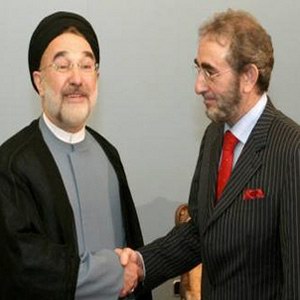Untitled Document
 |
|
Iranian President Mohammad
Khatami greets Iraqi Defence Minister Saadoun al-Dulaimi in Tehran |
Iraq's Defense Minister, on a historic visit to Iran, said that both
countries decided to launch a broad military co-operation.
"We have come here to turn a painful page and to open another," Saadun
al-Dulaimi said Thursday at a joint new conference in Tehran with his Iranian
counterpart Ali Shamkhani.
"I have come to Iran to ask forgiveness for what Saddam Hussein has done,"
al-Dulaimi said, referring to the 1980-1988 war between Iran and Iraq.
Dulaimi said that the two neighbors will launch military and "anti-terrorist"
co-operation, but he also asserted that it was still too soon for the U.S. to
leave his country.
Diplomatic relations between the two countries have improved greatly since
the 2003 U.S.-led invasion of Iraq.
The promise of co-operation comes despite the U.S. allegations that Iran is
aiding the Iraqi resistance and that it is seeking atomic weapons.
The Islamic republic strongly denies both charges.
"No one can prevent us from reaching an agreement," Iran's Defense
Minister Ali Shamkhani said when asked about the U.S. opposition.
Shamkhani also announced the formation of joint committees for military cooperation,
the fight against terrorism, and identifying the missing soldiers from the Iran-Iraq
war.
Iran has asked Iraq not to allow the United States to establish long-term military
bases on its soil, fearing that it would strengthen the American and Israeli
military domination of the region.
But Dulaimi promised that he will not allow the U.S. forces to use Iraqi soil
for attacks against the Islamic republic.
"Iraq will not be a source of insecurity and instability for any of its
neighbors. Nobody can use [Iraqi territory] to attack its neighbors," he
said.
The two ministers also said that more sensitive issues such as a full peace
accord and war reparations will be resolved later. The United Nations resolution
which ended the Iran-Iraq war didn’t provide for reparations.
"We have come to our Iranian brothers to ask them for help and we have
not yet started on the more sensitive issues," Dulaimi said.
They also discussed the continued presence in Iraq of Iran's main armed opposition
group, the People's Mujahedeen, which Saddam Hussein backed in his war on Iran.
"The Mujahedeen can stay in Iraq if they act like political refugees but
they will have no place if they act against Iran," Dulaimi said.
Last May the Iranian Foreign Minister Kamal Kharazi travelled to Iraq, becoming
the highest-ranking Iranian official to visit Baghdad since the fall of Saddam's
regime in April 2003.
An Iraqi government delegation led by Prime Minister Ibrahim al-Jaafari is
expected to visit Tehran next week.

